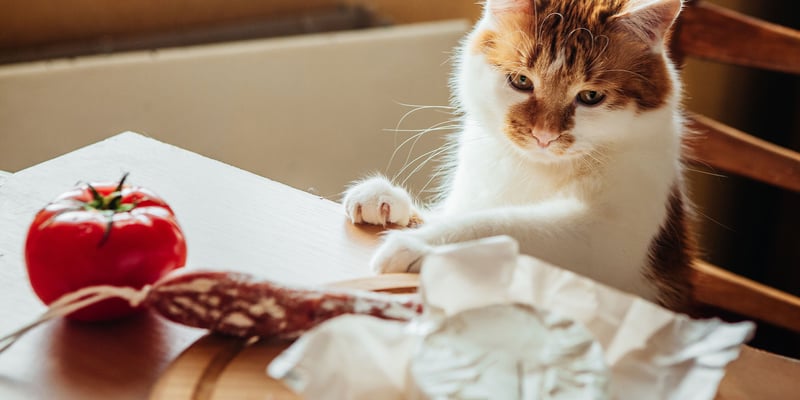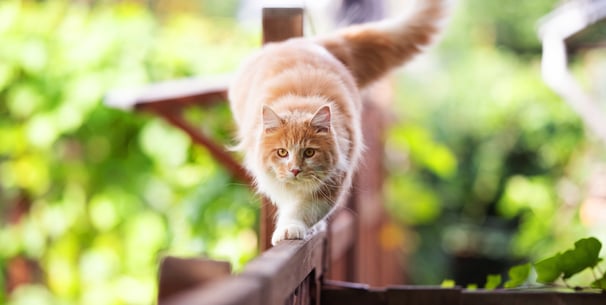Can Cats Eat Cheese? - Waggel Answers Your Cat Questions
Index:



Introduction
Can cats eat cheese? This is a common question for cat owners, especially when our feline friends beg for a nibble of our dairy snacks. While small amounts of certain types of cheese are not harmful to most cats, there are important considerations when it comes to incorporating cheese into a cat's diet.
Cats are obligate carnivores, meaning they need meat-based proteins to thrive and their bodies are not designed to digest dairy products well. Can cats eat cheese? Yes! However, too much cheese can lead to upset stomachs, diarrhoea, and other gastrointestinal issues. Then there are concerns about milk allergies or other dairy allergies.
Understanding your cat's dietary needs, sensitivities, and health conditions is key to making informed decisions about occasional cheese treats vs. making it a regular part of their menu. As cat owners, we want what's best for our pets and to avoid harming them with improper nutrition. Enter our in-depth blog post
Cats and dairy: the general overview
As obligate carnivores, cats require a meat-based diet to meet their needs and nutritional benefits. In the wild, feral cats get their protein and fat from prey like rodents, birds, and insects. For domestic cats, the primary sources of nutrition should come from quality animal-based proteins like chicken, beef, fish, and eggs.
Cats lack the digestive enzymes needed to properly digest lactose, the main sugar found in milk and dairy products. While kittens can break down lactose for a brief period while nursing, most adult cats become lactose intolerant. Consuming dairy can cause digestive upset like diarrhoea, vomiting, gas, and belly pain. Some cats are also allergic to the proteins in milk.
Cheese, yoghurt, milk, cream, butter and other human foods are not part of a cat's natural diet. These processed cow's milk products are high in calories and fat and low in the protein, vitamins and minerals that cats need. At best, dairy offers empty calories. At worst, it can lead to weight gain, gastrointestinal issues, and allergic reactions.
That said, most cats can tolerate a bit of cheese such as hard, lactose-free cheeses like cheddar or Swiss cheese. But dairy should only be an occasional treat for cats, not a dietary staple. Reading ingredient labels for lactose content and monitoring your cat's reaction is key. Focusing on quality protein sources, both wet and dry, is the healthiest way to feed your feline companions.
Is cheese good for cats?



Cheese contains fat, protein and minerals like calcium but lacks certain essential vitamins cats require like vitamin E and K. It is also deficient in the amino acid taurine, which cats cannot make enough of on their own.
One bite of cheese, such as a cube of cheddar cheese, contains 115 calories and 9 grams of fat. This dense fat and calorie content can contribute to obesity and pancreatitis in cats if they regularly consume too much cheese. However, the fat and calorie content can lead to obesity if over-fed to cats long-term.
Cheeses have varying amounts of lactose, which cats cannot properly digest. High-salty cheeses like feta or halloumi are high in sodium, increasing your cat's salt intake and may cause excessive thirst. In general, treats like cheese should make up less than 5% of a cat's total daily calories.
While an occasional small piece of cheese won't harm most cats, it does not provide complete nutrition. Cat owners should focus on high-protein, low-carb cat foods and limit fatty, empty-calorie dairy treats. Monitoring weight gain and litter box habits can identify digestive issues from dairy. Moderation and observation are key when giving cats food like cheese.
The curious case of kittens and dairy



Here are the key differences between kittens and adult cats when it comes to lactase enzyme digestion:
Kittens have higher levels of the enzyme lactase which allows them to break down the lactose found in their mother's milk while nursing during the first few weeks of life.
Lactase production begins to naturally decline around 8-12 weeks of age as kittens are weaned off milk and transitioned to solid foods.By the time cats reach adulthood, most have lost somewhere between 70-90% of their ability to digest lactose compared to when they were newborns.
This normal ontogenetic decline of lactase activity occurs because milk is no longer part of the diet after weaning.Without adequate lactase, lactose passes undigested into the intestines of adult cats leading to gas, abdominal discomfort, and loose stools. Some adult cats retain slightly higher lactase activity and may initially tolerate small amounts of dairy. But it is not a natural part of the feline diet.
Intestinal issues typically increase over time as adult cats drink milk or eat dairy products due to progressive lactase deficiency.
In summary, kittens possess a brief biological advantage for milk digestion that declines after weaning, making most adult cats lactose intolerant and poorly suited for digesting dairy products. This normal change in lactase activity must be considered when feeding any dairy foods to cats.
Lactose intolerance in cats: signs and symptoms
Lactose intolerance is the inability to properly digest lactose, a sugar found in milk and dairy products, due to a deficiency of the enzyme lactase in the small intestine.
In most adult cats, lactase production declines significantly after weaning, leaving them unable to adequately break lactose down into the smaller and more easily absorbed sugars glucose and galactose.
When cats consume dairy products, the undigested lactose travels to the large intestine where it draws in fluid and gets rapidly fermented by gut bacteria, producing gas, abdominal distention, and loose, frequent stools.
Common symptoms of lactose intolerance in cats include:
Diarrhoea
Vomiting
Excessive gas
Abdominal pain
Bloating
These signs of digestive upset typically begin 30 minutes to 2 hours after ingesting dairy and can last for 12-24 hours. Some cats may exhibit more chronic soft stools. The severity depends on the individual and the amount consumed.
Monitoring cats after any dairy intake and limiting or avoiding lactose-containing foods can prevent adverse reactions.
Which cheeses should you avoid for your cat?



Soft cheeses - The mould used to make mouldy cheeses like blue cheese can be harmful to cats. It is also very high in fat and salt content and, therefore, not recommended.
Cheddar cheese - Cheddar is a hard cheese, but still has the potential to cause digestive upset in cats. It's also high in saturated fat and sodium.
Cottage cheese - The curds and whey in cottage cheese mean it retains a very high lactose content and should be avoided by cats.
Feta cheese - Feta cheese is very high in fat and salt, and shouldn't be considered a regular part of a cat's diet.
Goat cheese - Goat cheese can be just as high in fat, salt and calories as regular cheese which means portion control is important. It is not a high-quality diet choice for your furry friend.
Overall, cheese for cats is not a natural part of a cat's diet and does not offer complete nutrition. While most cats can tolerate small infrequent amounts of low-lactose hard cheeses like cheddar, it is best limited to occasional cheesy treats.
Goat milk cheese does not provide benefits over cow milk cheese. Any cheese feeding should be monitored closely for gastrointestinal distress. A healthy, species-appropriate diet focused on quality protein sources remains ideal for meeting feline nutritional needs meaning moderation is key for lactose-intolerant cats.
Alternatives and recommendations
As obligate carnivores, cats require a high-protein, meat-based diet in order to thrive. Meat provides the essential amino acids like taurine that are critical for feline heart and eye health. Quality sources of animal-based protein like chicken, turkey, lean beef, white fish and eggs should make up the bulk of a cat's caloric intake, as cats have a higher protein requirement than dogs.
Plant-based proteins lack many of the key nutrients cats need even with synthetic supplementation, so meat cannot be replaced in a cat's diet. Treats like cheese lack proper protein sources for cats and can also contribute to excess calorie intake.
Better treat options to consider include small pieces of cooked chicken and fish or low-calorie vegetable broth ice cubes for hydration. Always introduce new foods gradually to check for any allergies. Consulting your vet for personalised nutrition advice tailored to your individual cat's age, known health issues, and needs is important.
If you're a Waggel member, you can gain access to unlimited vet advice for free at any time of day with Joii. They're an online vet care provider offering video calls and advice whenever you need it.
Conclusion



In summary, cats are carnivores with strict nutritional requirements. They need a meat-based diet high in plenty of protein from quality animal sources to thrive. As most adult cats are lactose intolerant, dairy products like cheese do not provide ideal nutrition for them.
While an occasional small treat for cats of the more popular cheeses low in lactose may be tolerated, it shouldn’t become a regular part of a cat's diet. We advise cat owners to be cautious and selective regarding your need to give your furry friend tasty treats and monitor for adverse reactions such as allergies.
Focusing on nutritionally complete cat foods high in meat protein content is crucial. This is what forms part of a balanced diet such as the benefits of ensuring they have a complete and low-sodium diet. To tailor dietary recommendations to your individual cat’s needs, including those with potential health hazards or health issues, we recommend speaking to your vet. Being informed about feline nutrition helps cat owners make the best dietary choices for the good health and well-being of their furry companions.
FAQs
What happens if my cat eats cheese?
Cats may experience digestive upset like diarrhoea, vomiting, gas, and belly pain due to the lactose and high-fat content. Overconsumption can lead to tummy troubles due to the possible additional ingredients in cheese.
Can cats eat blue cheese?
No, the mould used to make blue cheese can be toxic to cats, and the high salt content is unhealthy, potentially exacerbating salt intake concerns.
What kind of cheese can cats eat?
Small amounts of low-lactose hard cheeses like cheddar or parmesan may be tolerated, but cheese provides no nutritional value and any dairy should be limited or avoided. Remember, cheese intake should be minimal in a cat's diet to avoid any gastrointestinal distress.
Additional resources
It’s an undeniable fact we all want to be the best pet parents out there. The good news is that you totally can be by getting clued up on all things cat health. Take a look at our additional resources for informative, up-to-date advice.
Blood in cat’s stool: Understanding potential dietary causes and solutions. Read more.
Ringworm in cats: The importance of dietary choices in overall health and immunity. Read more.
Waggel Pet Insurance
Need more help? You're in luck if you're a Waggel Pet Insurance member. Along with our excellent coverage, we offer access to a 24/7 online vet to answer all your sticky questions, especially if you need grooming assistance.
Not a member? Why not get a quote now and cover your furry friend for a range of illnesses, all while enjoying our amazing perks and rewards.
Want more like this?
Get updates from us with helpful info, advice, answers to frequently asked questions and much more.
Index:
Related posts:
Get your quote
Along with our excellent coverage, we offer access to a 24/7 online vet to answer all your sticky questions.





